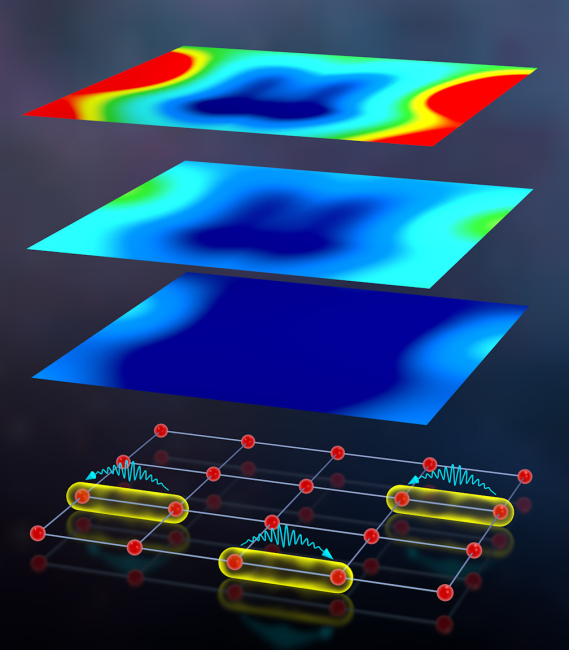Entanglement generation in weakly-driven arrays of multilevel atoms via dipolar interactions
| Author | |
|---|---|
| Abstract |
We investigate the driven-dissipative dynamics of 1D and 2D arrays of multilevel atoms interacting via dipole-dipole interactions and trapped at subwavelength scales. Here we show that in the weakly driven low excitation regime, multilevel atoms, in contrast to two-level atoms, can become strongly entangled. The entanglement manifests as the growth of collective spin-waves in the ground state manifold, and survives even after turning off the drive. |
| Year of Publication |
2024
|
| Date Published |
2024-12
|
| Journal Title |
Physical Review Letters
|
| Volume |
133
|
| Issue |
23
|
| Start Page or Article ID |
233003
|
| DOI | |
| Download citation | |
| JILA PI | |
| Related JILA Highlights | |
| Associated Institutes | |
Journal Article
|
|
| JILA Topics | |
| Publication Status | |
| Publication Image |

|


 The Physics Frontiers Centers (PFC) program supports university-based centers and institutes where the collective efforts of a larger group of individuals can enable transformational advances in the most promising research areas. The program is designed to foster major breakthroughs at the intellectual frontiers of physics by providing needed resources such as combinations of talents, skills, disciplines, and/or specialized infrastructure, not usually available to individual investigators or small groups, in an environment in which the collective efforts of the larger group can be shown to be seminal to promoting significant progress in the science and the education of students. PFCs also include creative, substantive activities aimed at enhancing education, broadening participation of traditionally underrepresented groups, and outreach to the scientific community and general public.
The Physics Frontiers Centers (PFC) program supports university-based centers and institutes where the collective efforts of a larger group of individuals can enable transformational advances in the most promising research areas. The program is designed to foster major breakthroughs at the intellectual frontiers of physics by providing needed resources such as combinations of talents, skills, disciplines, and/or specialized infrastructure, not usually available to individual investigators or small groups, in an environment in which the collective efforts of the larger group can be shown to be seminal to promoting significant progress in the science and the education of students. PFCs also include creative, substantive activities aimed at enhancing education, broadening participation of traditionally underrepresented groups, and outreach to the scientific community and general public.